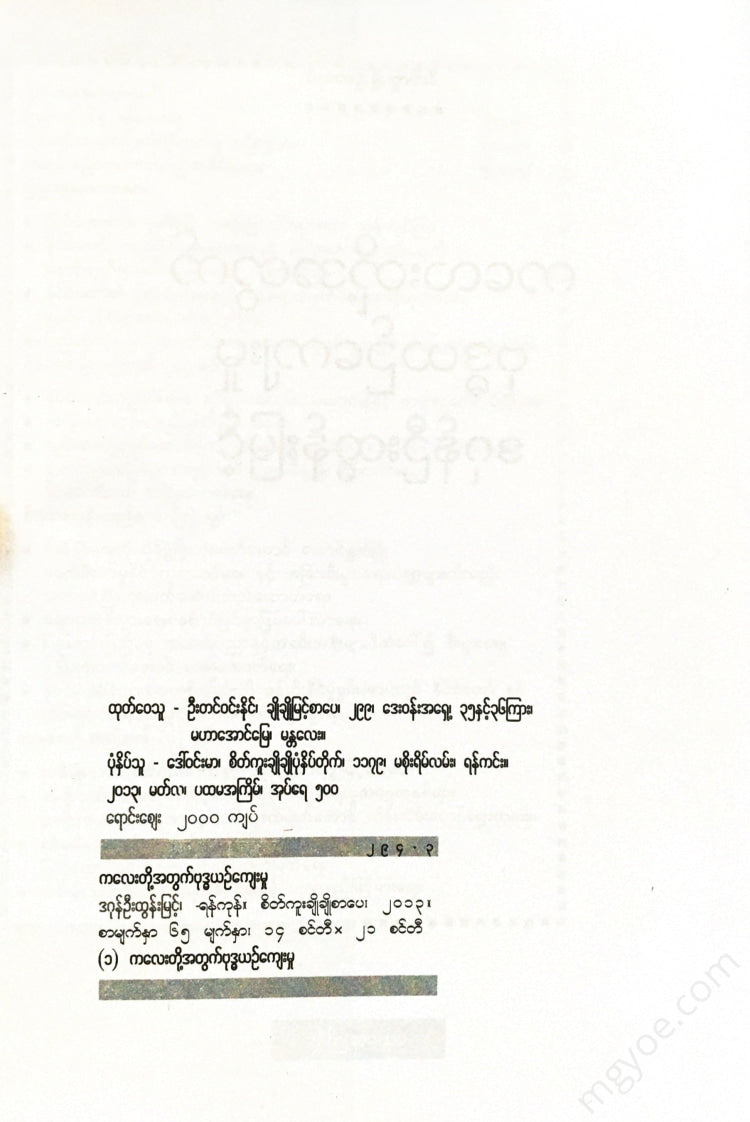စိတ်ကူးချိုချိုစာပေ
Dagon U Tun Myint - Buddhist Culture for Children
Dagon U Tun Myint - Buddhist Culture for Children
Couldn't load pickup availability
Children and Buddhist culture
Buddhist Myanmar people believe in karma, which is the belief that there is a cycle of life. They believe that beings continue to exist from one life to the next until they attain Nibbana. They believe that in this cycle of life, if they have good karma, they will live in a good life, and if they have bad karma, they will live in a bad life. Good karma refers to the good deeds they do. It is also called merit. If they have good karma, they will live in a good life, such as a human life or a divine life. Bad karma refers to the bad deeds they do. It is also called unmerited karma. If they have bad karma, they will live in a bad life, such as an animal life.
Buddhist Burmese believe that their existence in this life is due to good deeds and merit. They also believe that the happiness and joy they experience in this life is due to merit.
They believe that suffering is caused by bad and good karma. Good karma leads to good results. Bad karma leads to bad results because they firmly believe in the Buddha's words. Buddhist Burmese people firmly believe in the Buddha's words above, so whatever good things they experience is due to good karma. Whatever bad things they experience is due to bad karma. For example, if their job prospects are good, they consider it to be good karma without considering other factors. If their job prospects are bad, they consider it to be bad karma without considering other factors.
In the same way, they consider encountering trouble and danger to be due to unwholesome karma, and not encountering trouble and danger, and escaping from danger, to be due to wholesome karma. Sometimes, they even say that they are “lucky” when they encounter trouble and danger because of their own diligence. To put it more simply, they say that they are “lucky” when they stumble and fall and stumble over something. When they are about to be hit by a car and jump out of the way, they say that they are “lucky” when they are not hit.
In such cases, the child has already learned that it is because he touched something and slipped, or because he jumped and avoided being hit by a car. However, since he was young, he has been too attached to his belief in fate.
"Lucky change"
"Luckily I didn't get hit by a car"
They often say things like, "Oh, my God, I'm so sorry." From this, we can see how much Buddhist Burmese people believe in karma.
As they believe in this kind of karma , they do as much good deeds as possible to have a good life and experience happiness and joy in the next life. Because they will have many lives after this life. In this way, they believe that they will have a good life or a bad life according to the good and bad karma they have done. As they believe in this, they often do as much good deeds as possible to have a good life.
Those who do good deeds experience an abundance of love and affection, freedom from danger, and so on. They believe that good deeds can alleviate suffering even in this present life, so they do as much good deeds as they can.
The meritorious deeds that Buddhist Burmese people perform and accumulate are basically three: 1- giving and giving, 2- moral virtues that build and maintain moral values, and 3- meditation that cultivates the mind. Buddhist Burmese people perform and accumulate these meritorious deeds of giving and giving, moral virtues, and meditation at every opportunity from birth until death.







